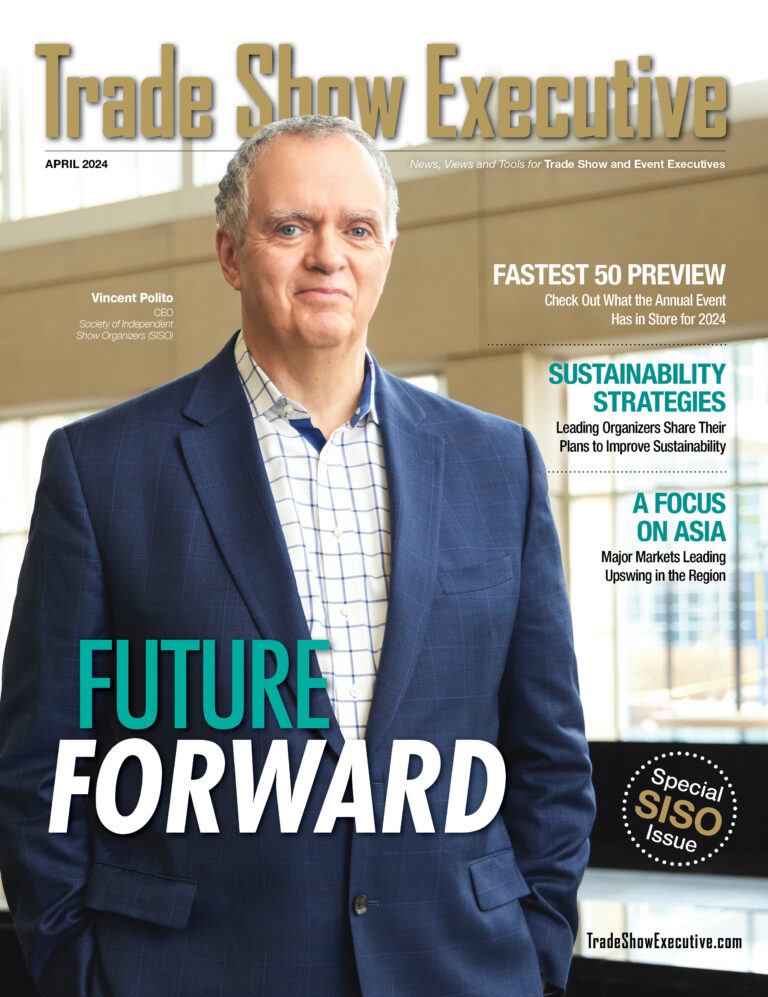Oceanside, CA – Minimum wage proposals and legislation are becoming as frequent as news about the Kardashians. That might be alarming to show organizers trying to control costs for their events. But the devil is in the details, and those details increasingly appear to address local issues or are targeted to certain sectors like hospitality and retail trades.
Trade show industry professionals are keeping an eye on how these proposals play out, but so far they haven’t raised many red flags and increases generally are being met with virtual shrugs, despite some concern from those who stage smaller events.
With some wage proposals far from finalized and others under siege for their narrow application, the jury appears to be out regarding how much impact these efforts will have on the trade show industry as a whole.
“A significant portion of work for trade shows is work likely paid above minimum wage already, so increases aren’t likely to impact show organizers yet,” said Bob McClintock, senior vice president and COO of the SMG convention center division, which manages 72 convention centers in the U.S., including those in Denver, Detroit, Houston, Philadelphia and San Francisco. That sentiment was echoed by Grant Bailey, assistant general manager for the Donald E. Stephens Convention Center in Rosemont IL, where all outside services are contracted through unions.
Yet some smaller shows that use non-union workers have noticed the rising costs. Last Summer, Tony Calanca, executive vice president of exhibitions for Advanstar Communications, warned that small shows might be the first to feel an impact—and he saw that prediction come true for the recent Comikaze event in Los Angeles. “Higher wages are hitting lower-end help like (non-union) cleaning, security and temporary registration staff at smaller shows,” he said, and that affects the show’s profitability.
But in Boston, which is largely a union city, minimum wage discussions are just a blip on the radar. Jim Rooney, executive director of the Massachusetts Convention Center Authority that oversees the John B. Hynes Veterans Memorial Convention Center, said Boston has organized labor even for security and hotel workers who already earn contracted wages above federal and state minimums. “We pay some attention to (minimum wage) issues regarding trade shows but more to collective bargaining issues,” he said.
At the opposite end of the spectrum, the Georgia World Congress Center in Atlanta is a non-union facility, but general manager Mark Zimmerman said he’s not alarmed by the flood of proposals. “Any increase is an expense that any facility is going to face,” he said. “It would be tough, as budgets are tight now, and it would make expenses go up when we already have to look at every dollar,” he added.
Nevertheless, Zimmerman said he’d never go back to customers already under contract and ask for more. “Our first initiative would be to cut back on expenses without passing those increases on to customers,” he said. Calanca echoed that sentiment. “We won’t in any way at this point raise rates to customers,” he said.
Hikes in Minimum Wage in 20 States
The overall wait-and-see approach is understandable as the wage hike scorecard becomes more crowded. More than 20 states enacted new minimum wage hikes that went into effect in January. And 29 states (plus Washington, DC) now have minimum wages above the federal mandate of $7.25 per hour.
Cities like Seattle, Los Angeles, Philadelphia and Chicago also are jumping into the fray. But legal action against some of those efforts has created even more uncertainty until the challenges can be sorted out. Some states, including New York and Pennsylvania, prohibit cities from enacting their own minimum wage mandates. But that doesn’t stop cities from trying. Officials in Philadelphia think they have found a loophole that will enable them to enact an $8.25 minimum in July — an effort that is being challenged.
Leave it to the States
Brian Crawford, vice president of government and political affairs for the American Hotel & Lodging Association (AH&LA), said it makes more sense to set minimum wage levels state-by-state, because it’s hard for the federal government to create a fair minimum wage nationally. The national rate hasn’t been raised since 2009. “If the President proposed a $10 per hour (minimum) nationally, it wouldn’t even register in cities like New York or San Francisco,” he said. That’s likely another reason there’s been minimal concern from trade show organizers so far.
Higher Hotel and F&B rates
Where minimum wages may end up having an impact is if a wage bump raises the cost of attending a trade show due to higher hotel, retail or restaurant wages. That could happen if bigger trade show destinations follow in the footsteps of Seattle or Los Angeles.
Seattle raised eyebrows when it passed a $15 minimum wage that would apply only to businesses with 500 employees or more — an action that’s being challenged by the International Franchise Association, which claims franchisees are being unfairly defined as part of the large companies for whom they operate franchise businesses like leased gift shops, newsstands, or coffee shops within a hotel. ”Those costs will be passed on to the consumer one way or another,” he said. “There comes a point when you price yourselves out of the market.”
The effort in Los Angeles to levy a minimum wage of $15.37 per hour only on the city’s hotels with more than 300 rooms also has met with ire from the hospitality sector, particularly after a survey conducted by Scottsdale, AZ-based WageWatch for the AH&LA, revealed that 81% of the 12,000 hotels surveyed had fewer than five positions that start at minimum wage.
Crawford, called that a big concern, noting that some hotels in Los Angeles are planning cutbacks when the ordinance goes into effect this summer. “Discriminating only against hotels is shortsighted,” he said, “and in our opinion violates federal labor law.”
Rooney acknowledged there may be “unintended consequences” from some higher wage proposals down the road. “Though the intent may be to create a living wage, it may raise rates at hotels, restaurants or convention centers,” he said. “Then the question is how those rates affect the ability to do business and make a profit.”
McClintock said it’s entirely reasonable that communities look at their own needs, the impact of wages on key industries and whether the city will remain competitive if the cost of doing business increases. But show managers, he said, look at rent and expenses. “The rent is fixed and may be negotiated years in advance, so SMG is used to that,” he said. Labor rates, however, are usually variable, depending on things like cost of living mandated increases as well as minimum wage laws. “Anything that increases costs in a community causes concern,” he said.
Reach Bob McClintock at (610) 729-7908 or BobMcClintock@smgworld.com; Jim Rooney at (617) 954-2470 or jrooney@massconvention.com; Grant Bailey at (847) 993-4608 or gbailey@rosemont.com; Mark Zimmerman at (404) 223-4200 or mzimmerman@gwcc.com; Tony Calanca at (440) 385-2455 or tcalanca@advanstar.com; Brian Crawford at (202) 289-3147 or bcrawford@ahla.com











